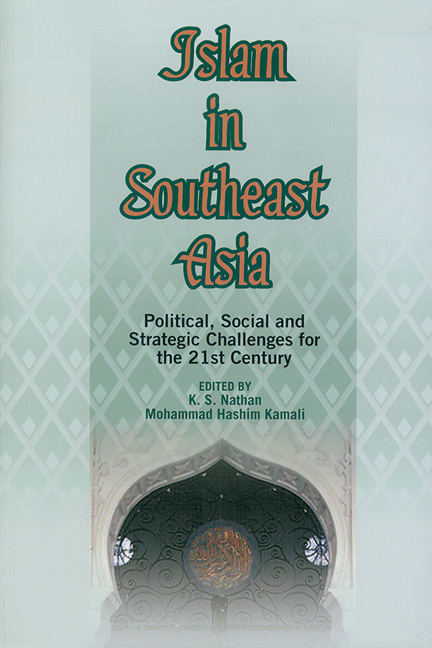Book contents
- Frontmatter
- Contents
- Preface
- Introduction: Understanding Political Islam Post-September 11
- PART ONE ISLAMIC DOCTRINE, HISTORY, GROWTH AND INSTITUTIONS IN SOUTHEAST ASIA
- PART TWO POLITICS, GOVERNANCE, CIVIL SOCIETY AND GENDER ISSUES IN SOUTHEAST ASIAN ISLAM
- PART THREE MODERNIZATION, GLOBALIZATION AND THE ‘ISLAMIC STATE’ DEBATE IN SOUTHEAST ASIA
- 11 Islam and Modernization
- 12 Modernization and the Process of Globalization: The Muslim Experience and Responses
- 13 The Malaysian Constitution, the Islamic State, and Hudud Laws
- 14 The Islamic State: Origins, Definition, and Salient Attributes
- PART FOUR IMPACT OF SEPTEMBER 11 ON ISLAMIC THOUGHT AND PRACTICE
- CONCLUSION: Addressing the Challenge of Political Islam in Southeast Asia
- Note on Contributors
- About the Editors
- Index
11 - Islam and Modernization
from PART THREE - MODERNIZATION, GLOBALIZATION AND THE ‘ISLAMIC STATE’ DEBATE IN SOUTHEAST ASIA
Published online by Cambridge University Press: 03 November 2017
- Frontmatter
- Contents
- Preface
- Introduction: Understanding Political Islam Post-September 11
- PART ONE ISLAMIC DOCTRINE, HISTORY, GROWTH AND INSTITUTIONS IN SOUTHEAST ASIA
- PART TWO POLITICS, GOVERNANCE, CIVIL SOCIETY AND GENDER ISSUES IN SOUTHEAST ASIAN ISLAM
- PART THREE MODERNIZATION, GLOBALIZATION AND THE ‘ISLAMIC STATE’ DEBATE IN SOUTHEAST ASIA
- 11 Islam and Modernization
- 12 Modernization and the Process of Globalization: The Muslim Experience and Responses
- 13 The Malaysian Constitution, the Islamic State, and Hudud Laws
- 14 The Islamic State: Origins, Definition, and Salient Attributes
- PART FOUR IMPACT OF SEPTEMBER 11 ON ISLAMIC THOUGHT AND PRACTICE
- CONCLUSION: Addressing the Challenge of Political Islam in Southeast Asia
- Note on Contributors
- About the Editors
- Index
Summary
INTRODUCTION
Modernity refers to the end result of the process of modernization. It is the condition that a society attains after having gone through specific patterns of social and economic change which began in Western Europe in the eighteenth century and which has been spreading throughout the rest of the world. The process of modernization refers to the introduction of modern scientific knowledge to increasing aspects of human life, first of all in Western civilization, then to non-Western societies, by different means and groups, with the final aim of achieving a better life as defined by the society concerned (Alatas, S.H. 1972, p. 22). The traits of modernization include the rationalization of economic and political life, rapid urbanization, industrialization, differentiation in the social structure, and greater popular involvement in public affairs. If we understand these traits as constituting the modern condition, then modernism would refer to the ideology, attitude or mentality that subordinates the traditional to the modern.
This chapter begins with a brief introduction to development studies as a modernist discourse. This is followed by a concise overview of the Islamic ideal of development which is juxtaposed to the economic realities of Muslim societies. It then proceeds to theoretically assess attempts in Muslim countries such as Malaysia, Pakistan, and Saudi Arabia to create an alternative discourse on development that draws on Islamic law and an Islamic philosophical anthropology. The next sections move on to a consideration of the role of the state in development and the questions of democracy and civil society. The concluding section makes some remarks on the problematic state of discourse in the Muslim world on modernization.
DEVELOPMENT STUDIES AS MODERNIST DISCOURSE
The vast majority of Muslims around the world live in economically underdeveloped countries, with high rates of inflation, low rates of economic growth, low life expectancy, and a high level of adult illiteracy. There are also severe problems in the health and nutritional status of Muslims worldwide, which have serious implications for the quality of human resources. Muslim countries also lag behind industrialized nations in educational attainment, especially where access to tertiary education is concerned (Hassan 1992).
- Type
- Chapter
- Information
- Islam in Southeast AsiaPolitical, Social and Strategic Challenges for the 21st Century, pp. 209 - 230Publisher: ISEAS–Yusof Ishak InstitutePrint publication year: 2005

